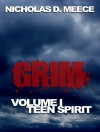Richard Marsh’s 'The Collected Works’ is an anthology that showcases the author’s diverse literary contributions, blending elements of Gothic fiction, psychological horror, and social critique. Marsh’s style is characterized by rich narratives, intricate characterizations, and an atmospheric tone that invites readers into the psyche of his characters. Set against the backdrop of late Victorian society, the collection reveals the tensions and anxieties of the era, exploring themes of morality, identity, and the supernatural, all while reflecting the stylistic experimentation that marked the period. Richard Marsh, an influential figure in turn-of-the-century literature, was known for his ability to navigate both mainstream and experimental genres. His varied career, which included writing for newspapers and engaging in legal work, undoubtedly shaped his perspective on human nature and societal norms. Marsh’s encounters with the complexities of urban life and issues of gender and power are evident throughout his works, providing layers of meaning that resonate with contemporary readers. This collection is a must-read for scholars and enthusiasts of Gothic literature, offering a comprehensive overview of Marsh’s oeuvre. With its haunting tales and profound insights into the human condition, 'The Collected Works’ invites readers to engage with a voice that remains hauntingly relevant today.
O autorze
Richard Marsh, the pseudonym of British author Richard Bernard Heldmann (1857–1915), was a prolific writer in the late 19th and early 20th centuries, best known for his supernatural and mystery novels. Marsh’s literary career was notable for its varied genres, including horror, crime, and romance, but he achieved the peak of his fame with the publication of 'The Beetle’ (1897), a novel which rivalled Bram Stoker’s 'Dracula’ in popularity at the time. Although 'The Beetle’ remains his most well-known work, his bibliography is extensive, encompassing over 80 books and numerous short stories, later culminating in collections such as 'The Collected Works’. His writing style is characterized by a penchant for suspense, the uncanny, and a keen insight into the human psyche, attributes that have garnered him a respected place in the annals of horror and mystery literature. Marsh’s contribution to these genres continues to be the subject of literary scholarship and has prompted a reevaluation of his broader impact on Victorian and Edwardian sensationalist fiction. Despite the inevitable waxing and waning of his literary reputation after his death, Marsh’s work has enjoyed a renaissance in recent years with scholars and enthusiasts revisiting his stories for their complex intertwining of fear, fascination, and the fin-de-siècle anxieties of his era.












